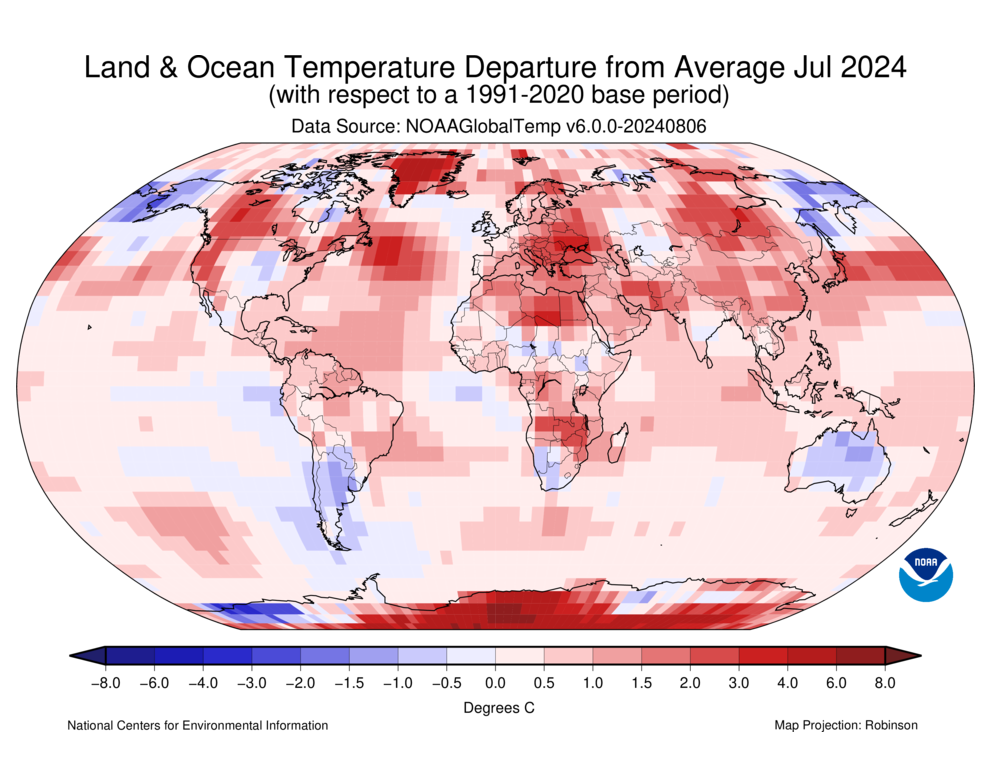Jakarta – July 2024 witnessed unprecedented heat, affecting hundreds of millions worldwide and highlighting the severe consequences of climate change, the World Meteorological Organization (WMO) said in a statement on August 13. The WMO said global average temperatures have set new monthly records for at least 13 consecutive months.
The month, marked by record-breaking temperatures, is now considered one of the hottest months in modern history, with July 6 as the hottest day ever recorded. According to the U.S. National Oceanic and Atmospheric Administration (NOAA), July 2024 surpassed the previous high by 0.03°C (0.05°F), making it “more likely than not the warmest month on record for the globe since 1850.” Similarly, the European Union’s Copernicus Climate Change Service ranked July 2024 as the second warmest month globally and the second warmest July in its ERA5 data record, just 0.04°C below the record set in July 2023.
“Widespread, intense, and extended heatwaves have hit every continent in the past year. At least ten countries have recorded daily temperatures of more than 50°C in multiple locations. This is becoming too hot to handle,” said WMO Secretary-General Celeste Saulo, reflecting the growing concern over the escalating heat.

The WMO’s April report highlighted Asia’s status as the most disaster-hit region in 2023 due to weather, climate, and water-related hazards. Floods and storms caused the highest number of casualties and economic losses, while the impact of heat waves grew more severe. The “State of the Climate in Asia 2023” report revealed an alarming acceleration of key climate change indicators, such as surface temperature, glacier retreat, and sea level rise, which pose significant threats to the region’s societies, economies, and ecosystems.
In 2023, sea-surface temperatures in the northwest Pacific Ocean reached an all-time high, and even the Arctic Ocean experienced a marine heatwave. Asia’s warming trend has nearly doubled since 1961–1990, with many countries experiencing their hottest year in 2023.
“The report’s conclusions are sobering. Many countries in the region experienced their hottest year on record in 2023, along with a barrage of extreme conditions, from droughts and heatwaves to floods and storms. Climate change exacerbated the frequency and severity of such events, profoundly impacting societies, economies, and, most importantly, human lives and the environment that we live in,” Saulo added.
According to the Emergency Events Database, Asia reported 79 disasters associated with hydro-meteorological hazards in 2023, over 80% related to floods and storms. These events resulted in more than 2,000 fatalities and directly affected nine million people. Despite the growing health risks posed by extreme heat, heat-related mortality is often underreported.
Armida Salsiah Alisjahbana, Executive Secretary of the Economic and Social Commission for Asia and the Pacific (ESCAP), highlighted the disproportionate impact of climate change on vulnerable countries, citing tropical cyclone Mocha, which struck Bangladesh and Myanmar in 2023. “Early warning and better preparedness saved thousands of lives,” she noted.
Alisjahbana emphasised the importance of the “State of the Climate in Asia 2023” report in bridging gaps between climate science and disaster risk. She affirmed ESCAP and WMO’s commitment to raising climate ambition and accelerating the implementation of sound policies, including ensuring early warnings reach everyone in the region as the climate crisis unfolds.
This summer’s extreme heat serves as a stark reminder of the urgent need for global action to mitigate the impact of climate change and protect vulnerable communities from its devastating effects. (Hartatik/nsh)















